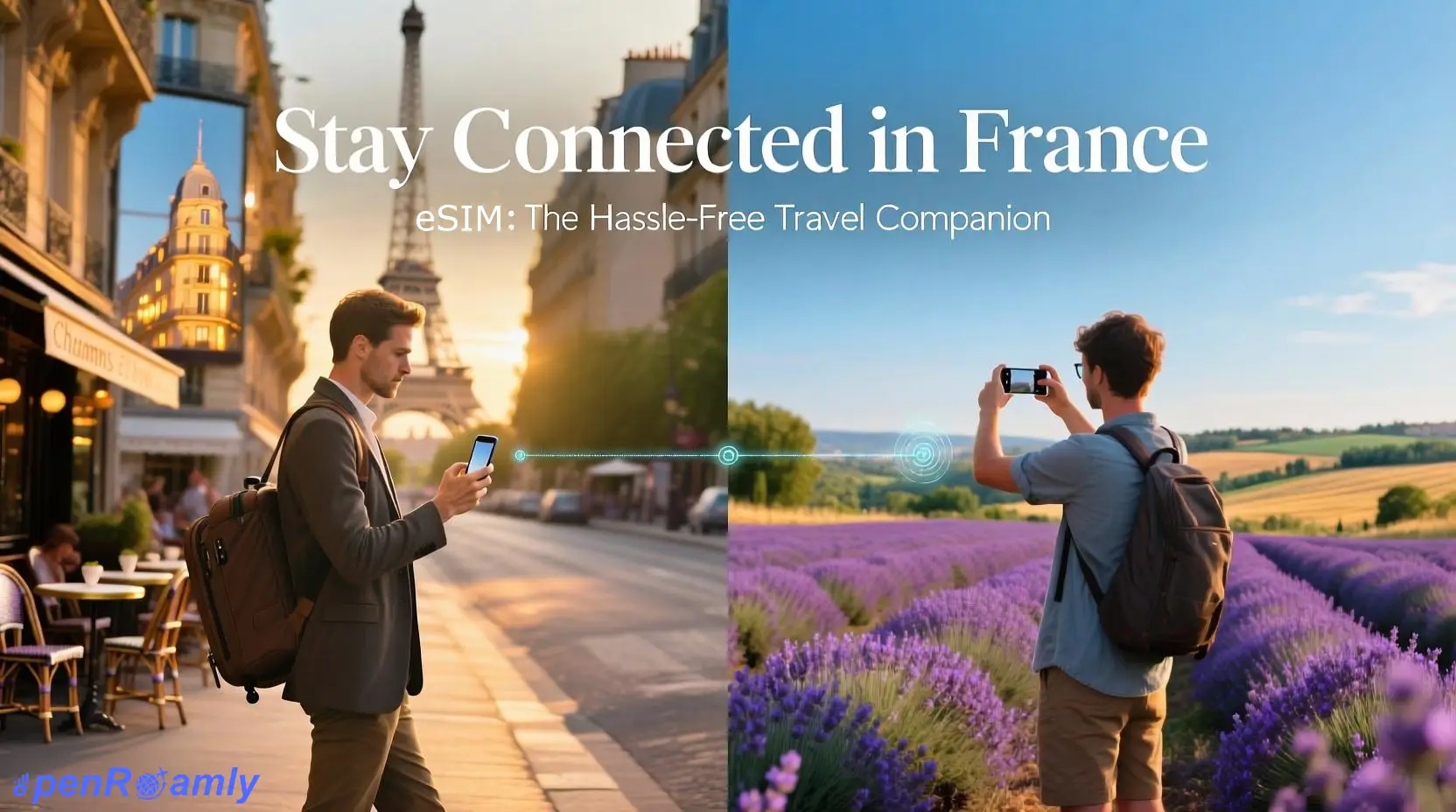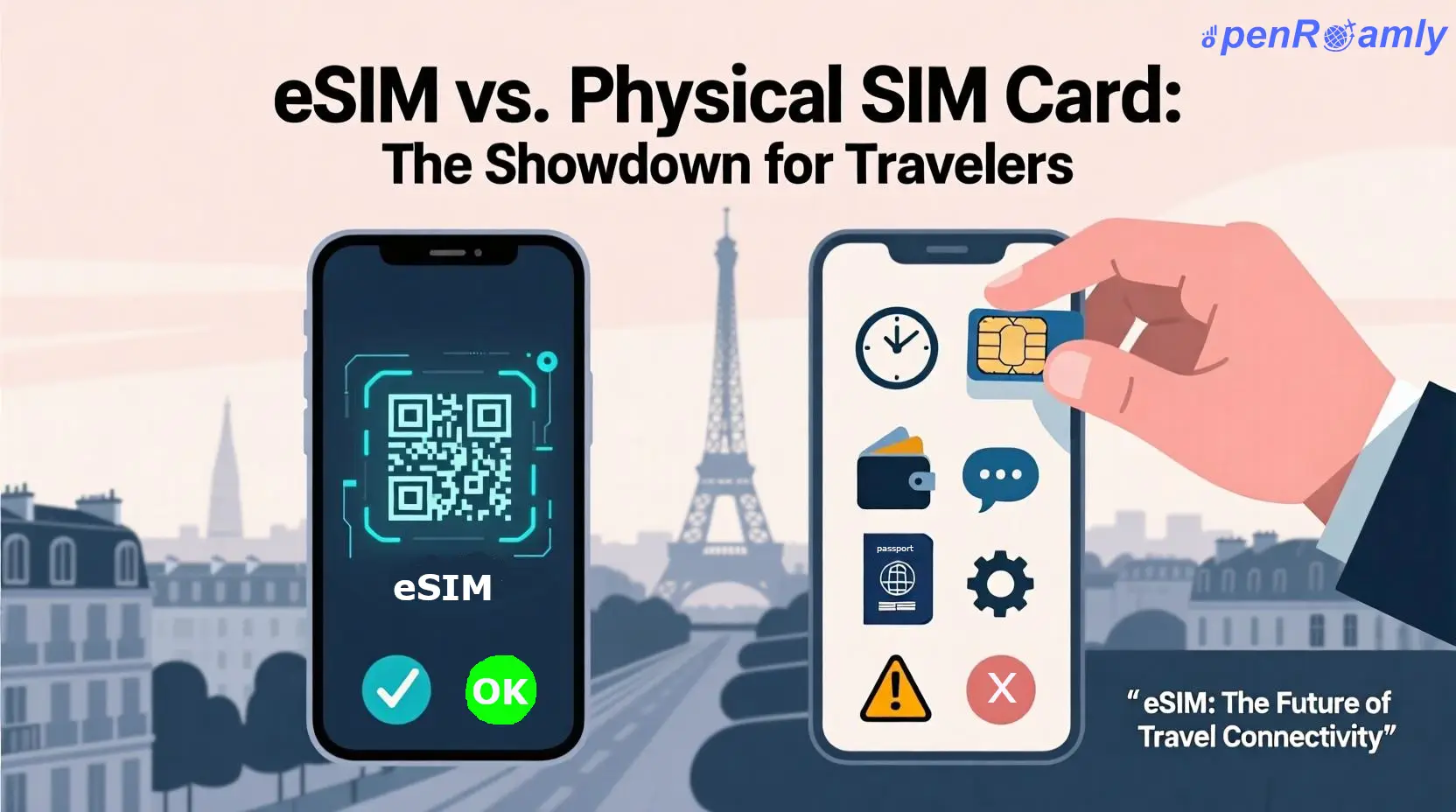eSIM France: The Ultimate 2025 Guide to Staying Connected

Whether you're strolling down the Champs-Élysées in Paris or getting lost in the lavender fields of Provence, a stable internet connection is the essential digital companion for any trip to France. It helps you navigate in real-time, translate menus, book tickets, and share every incredible moment with friends and family back home.
However, faced with a confusing array of options—from hunting for free Wi-Fi to buying a local SIM card—many travelers feel overwhelmed. This comprehensive guide will walk you through everything you need to know about getting online in France, with a special focus on a modern, hassle-free solution: the eSIM.

A Quick Look at France's Network Environment
First, let's understand the overall network situation in the country.
Network Coverage in Cities and Tourist Hotspots
The great news is that as one of Europe's tech hubs, France boasts excellent mobile infrastructure. In major cities like Paris, Lyon, Marseille, and Nice, as well as at top tourist sites like the Louvre, Palace of Versailles, and Eiffel Tower, you can expect extensive and fast 4G/5G coverage. Streaming video, making video calls, or uploading high-resolution photos will be a breeze.
Challenges in Rural and Remote Areas
If your itinerary includes exploring the French countryside, mountains, or quaint old towns, you may experience weaker signal strength. In these areas, your connection might drop to 4G or even 3G. Nevertheless, thanks to the broad networks of major carriers like Orange and SFR, basic communication and data services are generally reliable enough for checking maps and sending messages.
Free Wi-Fi: A Traveler's Best Friend or a Hidden Hassle?
Many travelers hope to rely on free Wi-Fi to save money, but is it a viable primary option?
Where to Find Free Wi-Fi
Airports & Transport Hubs: Paris Charles de Gaulle (CDG) and Orly (ORY) airports offer free, unlimited Wi-Fi.
Hotels & Accommodations: The vast majority of hotels provide complimentary Wi-Fi for guests.
Public Places: Many cafes, restaurants, museums, and large shopping malls also offer this service.
The Realistic Limitations of Free Wi-Fi
While seemingly ubiquitous, free Wi-Fi comes with several significant downsides:
Speed & Stability: Public networks are often slow and unreliable, especially during peak hours.
Cumbersome Registration: Most require a tedious sign-up process via email or phone number.
Security Risks: This is the most critical point. Using unsecured public Wi-Fi for online banking, payments, or logging into personal accounts exposes you to the risk of data theft.
Therefore, free Wi-Fi is best used as a backup, not a primary solution. For a smooth and secure online experience, a dedicated mobile data connection is essential.
eSIM vs. Physical SIM Card: The Showdown for Travelers in France
For a dedicated data plan, your two main choices are the modern eSIM and the traditional physical SIM card.
The Traditional Way: Buying a Physical SIM Card in France
Under French law, you must present your passport for identity verification to purchase any SIM card. You can buy one at carrier counters at the airport, in city-center stores, or at authorized tobacco shops (Tabacs).
Potential Pain Points:
Time-Consuming: You'll need to spend time finding a store upon arrival and may face long queues during peak tourist season.
Language Barrier: Communicating plan details with staff can be challenging.
Price Uncertainty: Tourist plans sold at the airport are often more expensive.
The Modern Choice: The Revolutionary Convenience of an eSIM
An eSIM (embedded SIM) is a digital SIM that is built into your phone. You simply purchase it online before your trip and activate it by scanning a QR code.
Feature | eSIM | Physical SIM Card |
|---|---|---|
Purchase Method | Online, instant delivery | In-person at a physical store |
Activation Time | Minutes, before or after landing | After arrival, requires queuing |
Convenience | No card swapping, keep home SIM active | Must remove and store original SIM |
Price | Transparent online pricing, wide variety | Airport prices are higher, limited options |
Best For | Tech-savvy travelers seeking efficiency | Travelers with non-eSIM phones or who prefer in-person purchases |
For the modern traveler who values convenience and certainty, the eSIM is the clear winner. It eliminates all the initial friction and uncertainty of getting connected abroad.

How to Choose the Perfect eSIM Plan for Your France Trip
The key to choosing the right eSIM is matching it to your usage habits. Here are our recommendations based on different traveler profiles:
1. The Light User / Budget Traveler
Profile: Mainly uses WhatsApp and Messenger to stay in touch, occasionally uses Google Maps (with offline maps), and posts a few photos to social media daily.
Recommended Plan: A total data package (e.g., 5GB for 15 days) or a daily plan with a smaller allowance (like 500MB/day) offers excellent value.
2. The Standard Traveler / Balanced User
Profile: Frequently uses online navigation, constantly looks up travel guides and restaurant reviews, and makes occasional short video calls to family.
Recommended Plan: A daily plan with 1GB or 2GB is ideal. This ensures you won't have to worry about running out of data and can enjoy a smooth online experience throughout your trip.
3. The Heavy User / Content Creator
Profile: Plans to live-stream their travels, frequently uploads high-res videos and photos to YouTube or Instagram, or watches streaming services on the go.
Recommended Plan: A high-data plan of 3GB/day or more, or even an unlimited data plan, will give you complete freedom from data anxiety.
4. The Short-Term / Business Traveler (1-3 Days)
Profile: In France for a quick business trip or a layover and needs efficient, reliable internet for work and information.
Recommended Plan: A pay-per-day plan offers the most flexibility, or a short-term total data package (e.g., 3GB for 3 days) can provide ample data.
5. The Long-Stay / Deep Explorer (15+ Days)
Profile: Spending several weeks or more in France for travel, visiting family, or working remotely.
Recommended Plan: Opt for a 30-day or longer plan for a lower per-day cost. You can choose between a large total data bucket or a long-duration daily plan, depending on which is more cost-effective for your usage.
Tip: Before you buy, check your phone's data usage statistics to estimate your average daily consumption. Multiply that by your number of travel days to get a good idea of your total data needs.
Pre-Trip Mobile Data Preparation Checklist
To avoid high roaming charges and conserve your mobile data while traveling in France, please complete the following settings and downloads using a secure Wi-Fi network before you depart.
✅ Download Offline Content
Use a stable Wi-Fi connection to download offline maps of France (e.g., Google Maps) and offline language packs for your translation app (e.g., Google Translate).
✅ Disable Cloud Backup & Auto-Sync
In your phone's settings, turn off automatic backup and synchronization for photos, videos, and files (e.g., iCloud, Google Drive). This prevents large, unexpected data usage in the background.
✅ Manage Background App Refresh
Go to your phone's settings and turn off "Background App Refresh" entirely, or disable it for non-essential apps (e.g., social media, news). This stops apps from updating content and consuming data when you're not actively using them.
✅ Turn Off Automatic Updates
In your device's system settings and app store (App Store/Google Play), disable automatic downloads for system and app updates. These files are very large and will quickly use your data.
✅ Use Secure Wi-Fi Wisely
Save all large downloads, updates, and sensitive tasks (like online banking) for when you are connected to a trusted, password-protected Wi-Fi network (e.g., at your hotel). Avoid transmitting sensitive information on public, open networks.
Pro Tip: When connected to your hotel's secure Wi-Fi, you can manually enable cloud backup and run any software updates. This allows you to use free Wi-Fi for data-heavy tasks.

Conclusion
When planning the perfect trip to France, internet access is the bridge connecting you to this beautiful country. While free Wi-Fi and traditional SIM cards are viable options, the eSIM has emerged as the superior choice for the modern traveler, thanks to its unmatched convenience, flexibility, and security. It allows you to get online the moment your plane lands, so you can begin your French adventure with confidence and ease.
Ready to enjoy a seamlessly connected journey? It's time to choose the internet solution that's right for you.
Ready for takeoff? Head over to the OpenRoamly France to discover the perfect data plan for your trip and make staying connected simple.